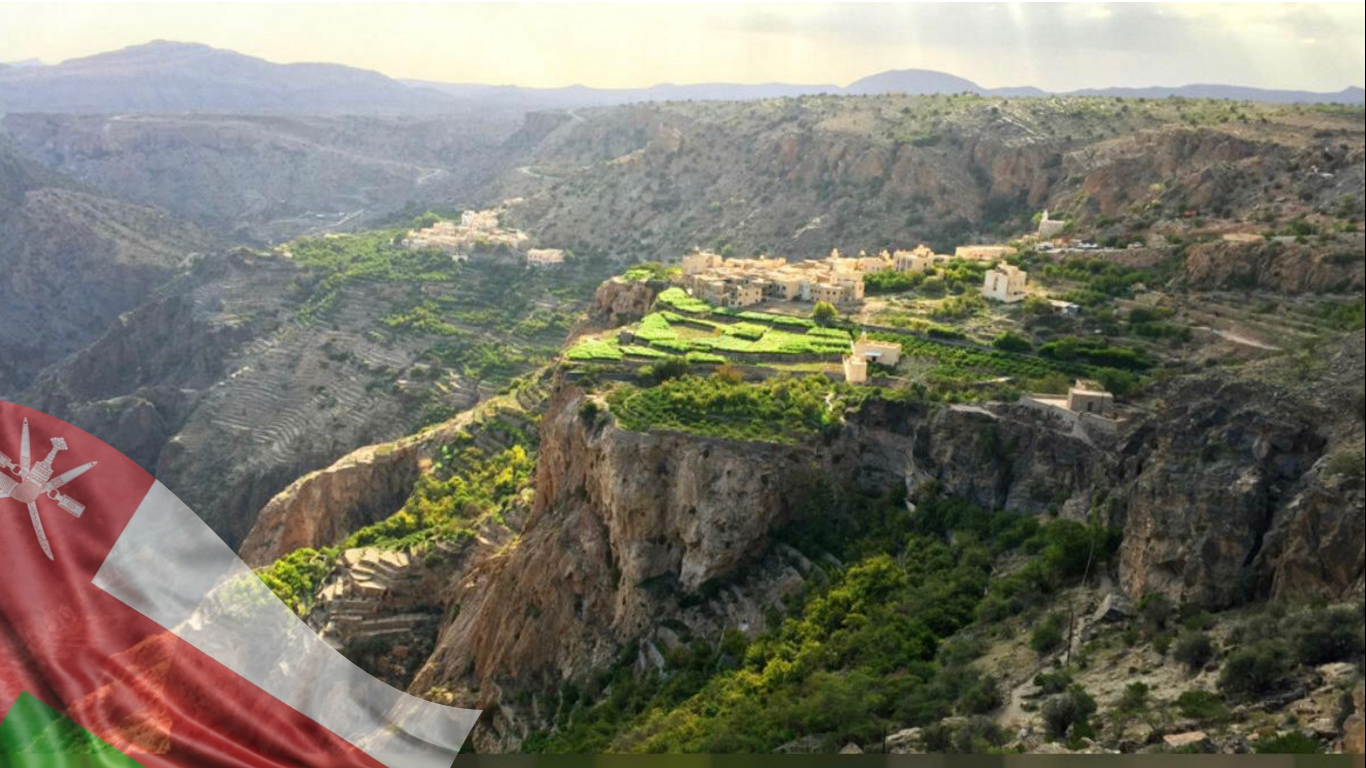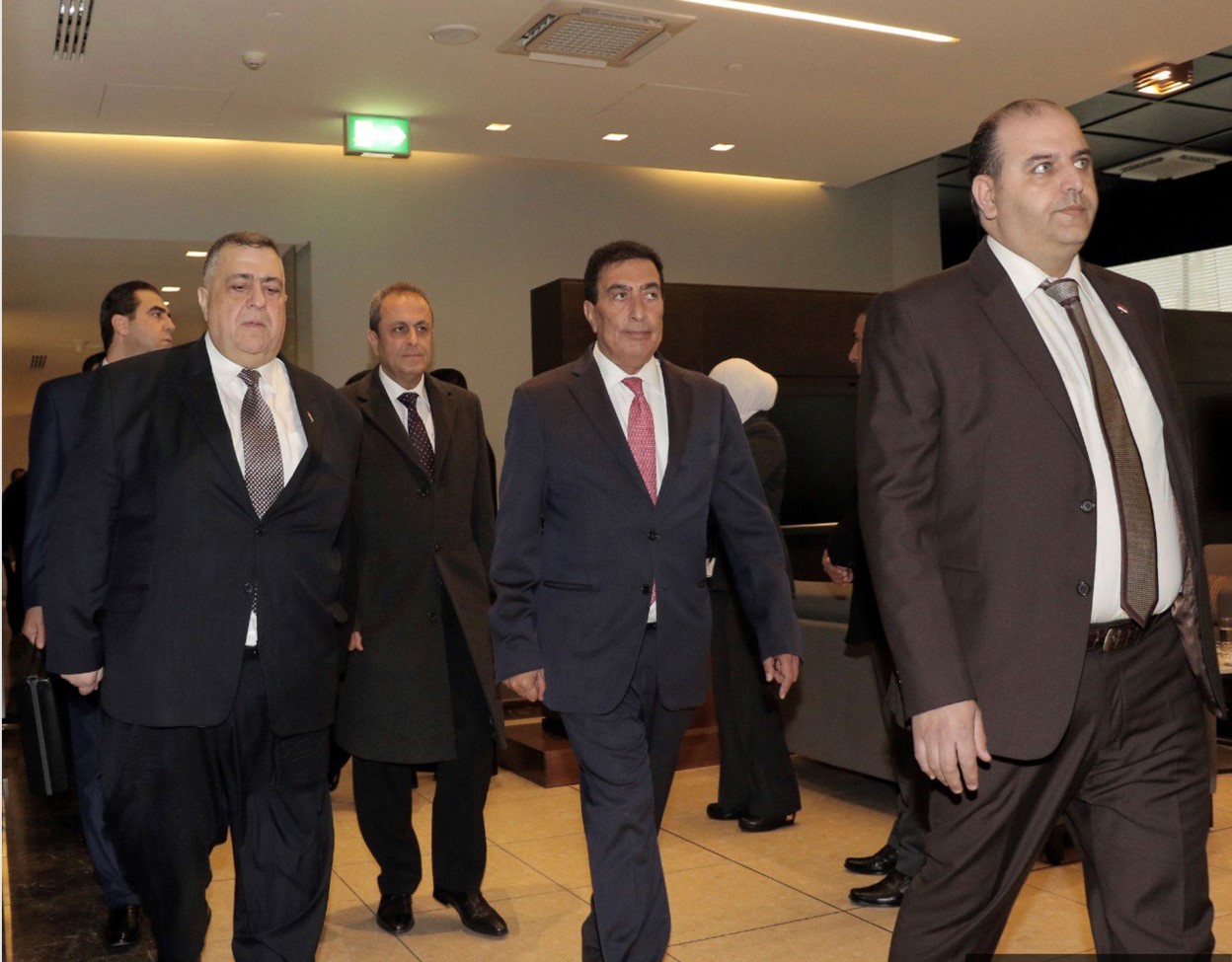International headlines are taken on by Venezuela, and French protests recently. Even on Middle East level, news now focus on Algeria – just like we did last week -, the future of Palestine and the general Iranian-Gulf struggle, especially in the light of the recent Warsaw summit. Thanks to these developments and the seeming stalemate on the field Syria tends to slip from international interest. This week, however, something happened, which might seem little, but in fact can prove groundbreaking. First time since 2011, when many Arab countries broke formal relations with Damascus and Syrian membership was suspended in the Arab League due the the war that erupted, on 6 March Syrian delegation took part in the Arab Parliament’s Amman session. This meeting might bare little direct significance, since it focused on the Palestinian matter and the status of Jerusalem in inter-Arab considerations. And that matter’s faith is very doubtful, since in Warsaw numerous Gulf diplomats expressed, that Palestine can be put secondary to the struggle against Iran. In other words, the Saudi-Emirati-Bahraini camp cares much less about Palestine, that to fight Iran and expects support for that matter. Considering these are the most financially well-off states and they enjoy the best relations with the West – and Israel, though so far in a non-official fashion -, this stance already casts very dark shadow in the future of Palestine. Given Syria’s intimate, almost crucial alliance with Iran, Syrian participation can do little to change the trend. But is that insignificant? If it is, why was Damascus even invited? This week, we shall look into the changing circumstances around Syria, since in the last six months or so, there are two absolutely contradictory trends. While most Arab and some European state seem ready to mend fences with the Syrian government, the US and the leading EU states – after a brief process of reconciliation – try to increase pressure on Damascus. Where is it all going now?
When it all started to change
Now far many, the case in Syria, both militarily and politically seems to be a frozen conflict, which might just awaits international agreement how to close it. That, however, was the general assessment even a year ago, when the case was much more complex. In February 2018, though the Syrian Army managed to consolidate most open fronts, still had major battles ahead of it. Many southern and eastern neighborhoods of the capital was still under terrorist occupation, most notable among them was the infamous al-Ġūṭa. That is the place where two major chemical incidents were blamed on the Syrian government. One in 2013 and the second one on the brink the liberation in 2018. While the first one is very clear by now to be a major deception, in the case of second one it is already proven, that most Western sources reported absolutely falsely, and no claimed attacks ever took place. Though most Western sources by the time this became obvious tried to spin the original claim, that there were never any chlorine usage in these neighborhoods by the rebels, salvaging the opposition’s tarnished image. The whole issue from the very beginning should have been more critically viewed, as it was proven by footages from 2013, that terrorist groups in control of inhabited areas were prepping children how to ack out false chemical attacks. Regardless any attempts to stop it, however, by 13 April 2018 all neighborhoods around Damascus became liberated.
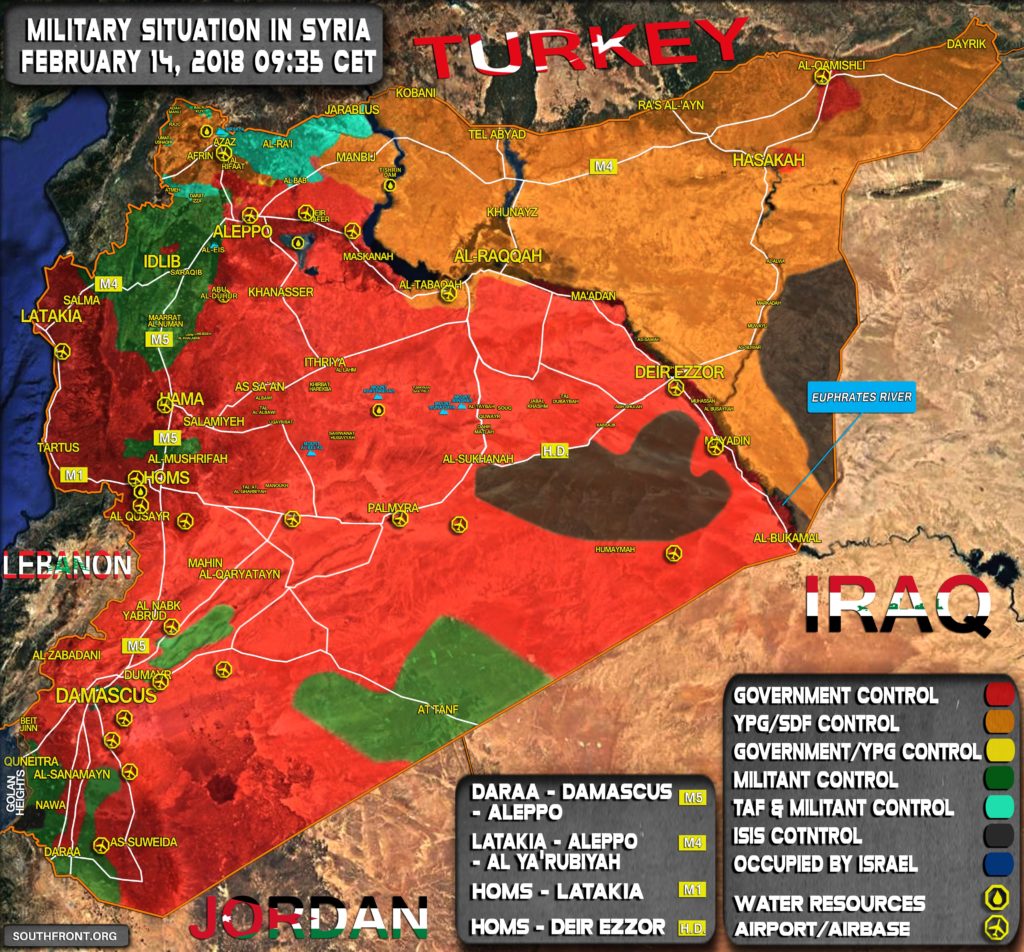
The next major step was the liberation of the south, the terrorist held areas of Dar‘ā and al-Qunayṭira provinces, where these groups enjoyed significant support from Jordan and Israel throughout the years of the war. The operation, however, proved to be swift and decisive by the Syrian Army, and by July 2018 the government announced the liberation of these areas. So swift that move was in fact, that many suspected it was preluded by international, possibly Russian-American-Israeli agreement, that these pockets cannot be saved. Whether that happened or not, by late summer 2018, most terrorists, who managed to reach an agreement departed to Idlib province, and only four open cases remained for the Syrian government in the path of complete liberation. Not counting, of course, al-Qunayṭira province under Israeli occupation for decades. The province of Idlib, where almost all terrorist organizations gathered, which left previously held areas in other parts of the country and managed to secure a safe passage with the government. Since then, they started to exterminate each other, though still conduct regular attacks to northern Ḥamā. Both against army positions and civilians. These case, however, might just prove the most complex, as parts of the area are held by the occupying Turkish forces and militant groups allied with them. Consequently, the solution waits for Russian-Turkish-Iranian-Syrian agreement. But for that to happen, Ankara wants to see the end of the possible Kurdish threat.
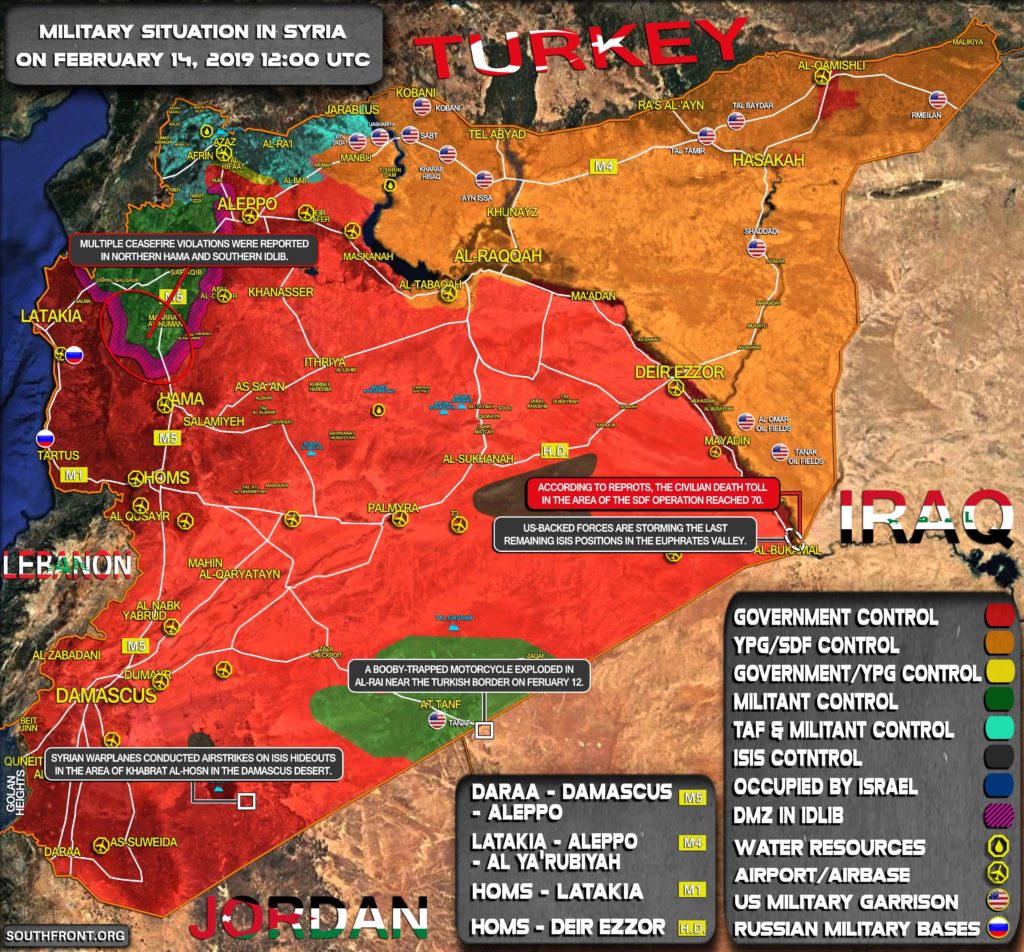
The second obstacle for Damascus is area roughly speaking north of the Euphrates, where YPG – practically PKK – militias hold the ground. Officially they fight under the Syrian Democratic Forces (SDF – in Arabic Qasd) banner to eliminate Dā‘iš, but in fact they were the very tool to facilitate illegal American and French military presence in Syria in the form of dozens of military camps. Even though the Americans perfectly now, that YPG, the most dominant part of SDF is practically PKK, which is designated even by the American government as a terrorist organization. So it is not surprising at all, given the historic struggle between Ankara and the Kurdish separatists, that Turkey does not want to leave the scene until this threat is not dealt with. Either by the destruction of SDF, or by Syrians taking over the area and disarming these militias. The picture is further complicated by the fact, that within this vast area there are strategic positions, like he city of Qāmišlī, which are held by the Syrian army and were always, during the years of the war. Damascus tacitly supported these Kurdish local groups to defend local population from the terror of Dā‘iš and other vicious groups. Now that Turkey is inside Syria, and given the fact that there is historic link between Kurdish separatists in Turkey and Syrian forces, Damascus is just not in a too big hurry to disarm these groups, as they eventually can be used as leverage against Ankara. Kurdish militants in general were betting on relentless American support, but since President Trump announced American withdrawal from this area in December 2018, they have to rethink their future. They either reach an accord with Damascus, and after major disarmament return these areas under Syrian government control, where they belong, or face Turkish military aggression. So far, like in the case on Manbiğ in late December 2018, the Kurds though hesitantly, but vote for the first option. So the cases of the north and Idlib are highly intertwined, and need major international agreements. Most importantly for the mentioned Kurdish matter, but Idlib is even more pressing. It is well known, that the majority of the terrorists fighting in Syria are not of Syrian origin, and many of them are in fact EU citizens. When one day the whole Idlib province will be liberated, these individuals will leave, and so far the only exit for them is Turkey. Ankara, very understandably does not want to take in tens of thousands of radical elements, therefore try to postpone this scenario as much as possible, at least until an understanding is reached with the EU, where these figures would end up. In both cases, however, if we don’t consider the immense suffering of local Syrians living under terrorist occupation, in the strategic sense time is on Damascus’ side.
The third problem for Damascus is the still present Dā‘iš activity in the Eastern desert and along the Iraqi border, but that is very clearly only matter of time. The organization by now not only lost its major revenues, but also the inroads from where new recruits could join. The fourth case is matter of the at-Tanaf base close to the Syrian-Iraqi-Jordanian triple border, which is held illegally by the Americans. That is a significant obstacle for Damascus, but for the time being, seems to be safely sealed of by the Syrian Army, not letting any radicals getting out from there.
Altogether, while a year ago still major parts of the country was held by terrorists, by the end of 2018 only Idlib and the Kurdish held areas were major problems for Damascus. Not counting the constant Israeli aggressions. These two matter need international solution, since as for Damascus it would not be impossible to liberate them, but the cost after eight long years does really matter. Not only the international considerations, not to close the war with a bloodshed, but by the already high losses in the Syrian side, both army and civilian. No one should have any doubt, however, that the Syrian government is determined to liberate every inch of the country. As President Baššār al-Asad made it clear in his last speech on 17 February 2019.
The diplomatic shift
These changing dynamics on the ground prompted action on the diplomatic side. While the US and EU countries may afford to hold the Syrian government in confinement and pretending it doesn’t exit, local and especially Arab countries simply cannot do that. Those Arab states, which broke their ties with Damascus and supported the war on Syria now have to settle for some sort of agreement. Not so much for Syria itself, but because Damascus has many friends on common Arab organizations from the Arab League to the Arab Parliament. Now that the realities on the ground change, they are more active, that the matter has to be solved. The real major factor, that prompted action was probably Trumps announcement on American withdrawal. Because if the Americans eventually give up, that the show is truly over and Syrian won the war.
On 16 December 2018 Sudanese President ‘Umar al-Bašīr made a surprise visit to Damascus. As the two sides discussed general security and economic matters, nothing deep or substantial, one was left thinking what is behind it. Though this visit was soon followed by a similar visit by the Iraqi president, that is less surprising, since Baghdad was firmly beside Damascus in these last troublesome years. But the visit of al-Bašīr is much more significant, given that there is no major collusion, nor friendship between the two sides. Nor in the level of the countries, nor on the personal level of the two presidents. Which just made al-Bašīr the ideal parliamentarian to deliver a message. The only real question was, that who could have sent the massage, since the content was obvious. If Damascus ready to make concessions, mostly on economic terms, the Gulf states are ready to mend fences. The massage either came from Qatar, or from Saudi Arabia, since both camps have strong possessions in Sudan. But given the close Qatari-Turkish ties, and that Ankara is already capable to send messages via Iran and Russia, Riyadh is the more probable suspect. Which was soon confirmed. The inter-Arab dynamics are still active and complicated, however, almost instantly after the visit major protests started in Sudan. Since the details here clearly resemble those of many Arab country from 2011 –
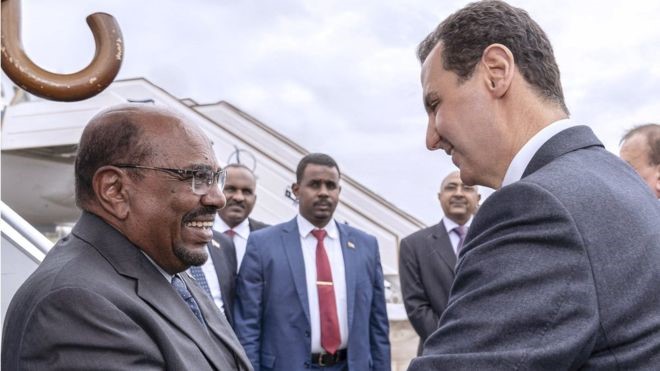
which by now we know, that were instigated from abroad – it is safe to assume, that some forces were not to happy by this reconciliatory process and might wanted to deliver a massage of a different kind. One other step also point to the direction, that now it was Riyadh, who sent the courtier. On 27 December 2019, so only less than two weeks after al-Bašīr’s visit, the Emirates reopened its embassy in Damascus. Though Western sources announced this as a major breakthrough and success for the Syrian president, ironically Syrian public opinion was almost outraged. Since after all what Gulf states had done against Syria, it is understandable why they are not welcomed anymore. Quite at the same time, the Saudi government was greatly reshuffled, and a new foreign minister was appointed.
While the new minister, Ibrāhīm al-‘Assāf was not long before among the princes held in custody under corruption charges, he has considerably better personal relations to the Syrians. His predecessor, ‘Ādil al-Ğubayr, who was among the biggest regime change apologists became officially sidelined, though not dismissed, which is also a sign.
The Warsaw summit on 13-14 February 2019, which was codenamed “Peace and Security in the Middle East”, tried to forge an anti-Iran war partly and an Israeli-Gulf alliance, was in fact a big failure for Washington. But what is significant, is that though the summit officially aimed to promote peace in the region, and in fact concentrated on Iran, in fact had almost nothing to do with Syria. Simply, it was not in the agenda. Once again indicating, that this case is closed. While much of the Arab press focused on the question under what conditions can Syria return to the Arab League, Damascus made its point clear. Syrian will not return to the League, since it never left it. Therefore, the League has to apologize and ask Damascus’ renewed participation. We can suspect, that there are still major negotiations going on behind the scenes, as just how much Gulf economic interest can prevail in the reconstruction and the future Syrian economy. And whether the Saudi or the Qatari lead camp will have a preference. What so far the Syrian position suggest is that Damascus is not about to give any concessions to either Arab party. That is quite understandable, since their presence in the Syrian economy proved to be a liability in 2011, while by the war Damascus had to make serious favors for Russia and China. Not to mention Iran.
It is unlikely, that the Saudis and the Emiratis wouldn’t see this. So why are they pushing for a settlement amidst their still vitriolic rhetoric? The reality now simply forces itself upon them. Whether they acknowledge it or not, Syria will return as a significant player in the regional equation. If they don’t settle, they will just have to deal with an influential state, which they perceive as an Iranian proxy. So now they try to salvage as much as possible from their already lost interests, and give a last futile attempts, to distance Damascus even by an inch from Tehran. Nonetheless, the realpolitik behind this reconciliation is that it is still better to slowly agree with Syria, than to keep on pushing a dead case. The first major, official step in this chain was the mentioned Arab Parliament session, where after long years a Syria was invited. Which had many symbolic gestures, since the Syrian delegation was lead by the Speaker of the Syrian Parliament, Ḥammūda Yūsaf aṣ-Ṣabbāġ. Thought he is a relatively lightweight person in Syrian politics, and definitely not someone from the inner circle, he is an Assyrian, a Syriac Orthodox Christian, from the eastern part of the country, al-Ḥasaka. Meaning he himself represents much of what Dā‘iš and its supporters wanted to destroy from the Syrian social fabric.
The counter current
So as we could see by now, Syria seems to be steadily back on the international forums. Soon after the Emirates several EU and Arab countries reopened their embassies, or are on the way to do so. Yet recently a completely different trend started to emerge. As Arab states are moving closer to Damascus, the West somehow seems to turn slowly around.
The most troubling, thought least surprising is that the Americans backpedaled on the withdrawal. There are considerable political forces there, to make this withdrawal impossible. France already announced to continue its illegal presence in Syria, and French military activity increased even though the Syrian Army already arrested 60 French snipers back in May 2018. More surprising is the renewal of the economic pressure. Since January 2019, both the US and the EU enacted new sanctions against Syria, specifically targeting government officials and businesses.
Yet the most puzzling move was, however, made by the International Criminal Court (ICC) also this week, on 7 March. In a case presented in the name of 28 refugees residing in Jordan, the ICC wants to persecute Baššār al-Asad personally, and bring him to Hague. Let alone how ridiculous this is, after all nor Tony Blair, nor anyone from the Bush administration was charged for the Iraqi invasion, which claimed millions of lives, nor Saudi is targeted now for Yemen, even in context with Syria there would be more pressing questions. This move in fact makes so little sense, that is impossible not be politically motivated. But why, and why now?
Where are we heading?
Strategically speaking the case is almost at the end. Even a year ago, in a much worse position there was no realistic chance to achieve regime change in Syria, which was the dream since early 2011. Someone knows the Saudis and the Emiratis, know perfectly well, that they are incapable to make such a major step to mend fences with Syria without American consent prior. So if the Emirates and the Bahrainis reopened their embassies, that means that Riyadh approved it, which means that Washington allowed it. Even suspected that is promoted it. Than simply, why the renewed pressure, especially that it is little likely that they will achieve anything? By now, Syria is obviously over the worst. If the Syrian economy did not collapse until now, it will unlikely to do so now, with increasing Russian and Chinese economic support.
The answer might be twofold. In one hand, the West might came to the conclusion to let Syria go, but might just achieve much by political means. If Damascus can be forced to allow international interference in the constitutional redraw and the new elections, than regime change might be achieved. Or at least some positions can be secured for the very opposition, that the West supported in the last few years. Also, in the same process, economic possessions might be secured as well, or conditions for the Kurds, who can eventually become a bulwark of another major operation, if the situation calls for it. How much these considerations are realistic, or at least how much hope is put in it is hard to tell.
But there are security concerns, which are way more obvious and can be clearly understood. In one hand Israel is a top priority both for the US and the EU. Now Syria coming out of the pressure, will prove to be stronger and might just be even more resolute. Whether it shall or not is one thing, but it is surely viewed this way, as the US deploys it best air defense system into Israel. But apart from that, here referring back to the French snipers, by now the Syrian forces have numerous Western operatives and soldiers – informal or otherwise – in their custody. Those states surely want them back. Also, Syrian intelligence has immense knowledge of all those foreign fighters who showed up in recent years in the Syrian frontiers. Many of them are now in Idlib ready to go “home”, or already left and on the way to arrive. Reaching cooperation on this matter is critical for several states, and understandably Damascus will ask a high price for it.
What should be understood by now, is that Syrian security, exactly for these reasons, is by now inseparable from European security. Syria, with Russian military and Chinese economic help will eventually get through the crisis, but can the West afford itself to blindly carry on a failed war? It would be time for now for reconciliation, for which some apologies would be a good start.

